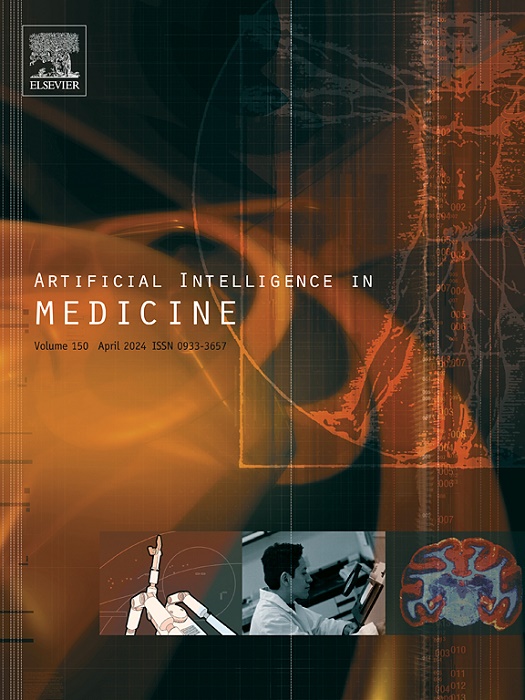Enhancing colorectal polyp segmentation with TCFMA-Net: A transformer-based cross feature and multi-attention network
IF 6.2
2区 医学
Q1 COMPUTER SCIENCE, ARTIFICIAL INTELLIGENCE
引用次数: 0
Abstract
To enhance polyp segmentation in colonoscopy images for early detection and diagnosis of colorectal cancer. The study proposed the Transformer-based cross feature multi-attention network (TCFMA-Net) for polyp segmentation by addressing challenges such as varying polyp sizes and the problem of accurate boundaries. TCFMA-Net utilizes swin transformer-based encoders, a cross-feature enhancer network with multiple cross-feature enhancer blocks, and multi-attention modules integrated within and outside the decoder blocks. This enables comprehensive cross-feature fusion, preserving image clarity and facilitating the flow of information, allowing efficient processing of both low-level and high-level features. TCFMA-Net effectively captures the complexities of polyp size variations and boundaries issues and consistently outperforms existing methods on six benchmark datasets with confidence interval (CI), achieving a Dice score of 92.74 ± 0.10, (CI: 91.92, 94.04), 91.46 ± 0.14 (CI: 91.12, 92.72), and 87.34 ± 0.13, (CI: 86.19, 88.10) on the CVC-ClinicDB, Kvasir-SEG and BKAI-IGH datasets respectively, demonstrating its robustness in diverse polyp segmentation tasks. Generalizability tests also yielded Dice scores of 89.51 ± 0.10, (CI: 88.67, 89.71), 72.91 ± 0.09, (CI: 71.39, 74.14), and 65.83 ± 0.22, (CI: 65.47, 66.52) on the CVC-300, CVC-ColonDB, and Polypgen databases respectively. TCFMA-Net demonstrates superior performance in segmenting polyps across datasets, effectively handling variations in polyp characteristics and demonstrating robust generalization capabilities. This study presents a significant advancement in polyp segmentation methods, offering an accurate and reliable tool for colorectal cancer diagnosis.
TCFMA-Net增强结直肠息肉分割:基于变压器的交叉特征和多关注网络
目的:增强结肠镜图像中息肉的分割,为结直肠癌的早期发现和诊断提供依据。该研究提出了基于transformer的交叉特征多注意网络(TCFMA-Net)用于息肉分割,解决了息肉大小变化和精确边界等问题。TCFMA-Net采用基于swin变压器的编码器,具有多个交叉特征增强块的交叉特征增强网络,以及集成在解码器块内外的多注意力模块。这可以实现全面的跨特征融合,保持图像清晰度,促进信息流,允许有效处理低级和高级特征。TCFMA-Net有效捕获了息肉大小变化和边界问题的复杂性,并在6个具有置信区间(CI)的基准数据集上持续优于现有方法,在CVC-ClinicDB、Kvasir-SEG和BKAI-IGH数据集上分别获得了92.74±0.10 (CI: 91.92, 94.04)、91.46±0.14 (CI: 91.12, 92.72)和87.34±0.13 (CI: 86.19, 88.10)的Dice得分,显示了其在不同息肉分割任务中的鲁棒性。在CVC-300、CVC-ColonDB和polygen数据库上,可推广性测试的Dice评分分别为89.51±0.10 (CI: 88.67, 89.71)、72.91±0.09 (CI: 71.39, 74.14)和65.83±0.22 (CI: 65.47, 66.52)。TCFMA-Net在跨数据集分割息肉方面表现出卓越的性能,有效地处理息肉特征的变化,并展示了强大的泛化能力。本研究提出了息肉分割方法的重大进展,为结直肠癌的诊断提供了准确可靠的工具。
本文章由计算机程序翻译,如有差异,请以英文原文为准。
求助全文
约1分钟内获得全文
求助全文
来源期刊

Artificial Intelligence in Medicine
工程技术-工程:生物医学
CiteScore
15.00
自引率
2.70%
发文量
143
审稿时长
6.3 months
期刊介绍:
Artificial Intelligence in Medicine publishes original articles from a wide variety of interdisciplinary perspectives concerning the theory and practice of artificial intelligence (AI) in medicine, medically-oriented human biology, and health care.
Artificial intelligence in medicine may be characterized as the scientific discipline pertaining to research studies, projects, and applications that aim at supporting decision-based medical tasks through knowledge- and/or data-intensive computer-based solutions that ultimately support and improve the performance of a human care provider.
 求助内容:
求助内容: 应助结果提醒方式:
应助结果提醒方式:


